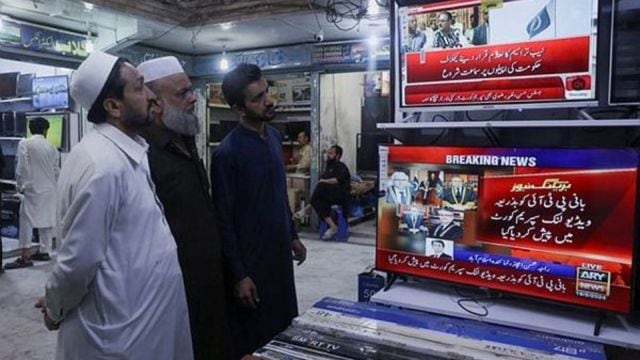
The PTI-Imran Khan saga
Imran Khan and his party PTI have been making news all week. On May 15, the Islamabad High Court approved Khan’s bail petition in the Al-Qadir trust case. Despite relief in this case, he will remain incarcerated for the many other cases in which the former PM has been convicted. Meanwhile, his party has been changing its mind about talks with other parties — initially stating they would speak to no one, then claiming that they would only speak with the “real” power and finally, most recently, the PTI has demanded that cases against its members be withdrawn and all its political prisoners released.
Dawn (May 16) puts the onus of resolution on both sides saying, “In a democracy, negotiations are a fundamental process for resolving conflicts and reaching consensus. However, entering talks with rigid preconditions undermines the process… That said, the government, having the upper hand, must take the lead and initiate dialogue to ease tensions.”
News International (May 17) slams the parties for disregarding the people’s interest saying, “At a time when the entire country is reeling under an intense heatwave, when it has become extremely difficult for people to foot their electricity and other utility bills… the PTI wants more political drama… It would be better if all political parties… sit together, develop a consensus on the current crisis… ensure a free and fair election the next time around, and lead the country out of the mess it is in right now.”
Three months after elections, instability continue
The Supreme Court overturned the Peshawar High Court’s decision that had denied 77 reserved seats to the Sunni Ittehad Council (SIC) and instead allocated them to other political parties. With the PTI-backed SIC gaining seats, the ruling PPP-PML(N) coalition has lost its 2/3rd majority as well as any power for constitutional amendments — leading to yet another political crisis
Express Tribune (May 15) condemns the ECP’s role in this saga by pointing out that this episode “highlighted the executive highhandedness of the electoral watchdog which was unrelenting in pushing the PTI to the wall, and did not cede to any of the privileges that the PTI-Sunni Ittehad Council nomenclature would have procured by law.”
Dawn (May 15) agrees with the same saying, “Despite being vested with all the powers it needed to responsibly steer the country through a democratic transition, it could only manage an election that fell far short of the promise of being ‘free, fair, impartial and inclusive’.”
Protests in PoK
Last week, Pakistan-occupied Kashmir saw protests triggered by the Awami Action Committee (AAC) against skyrocketing electricity bills and taxes. Unfortunately, there has been a loss of lives on both sides — officials and protestors. PM Shehbaz Sharif has taken responsibility and expressed regret over this discontent. Kashimir PM Chaudhry Anwarul Haq has called for peaceful resolution.
News International (May 14) commended this swift action by the stakeholders saying, “it was good to see the PM’s political adviser and senior PML-N leader, Rana Sanaullah, admit that the government ‘mishandled’ the situation in Kashmir. From President Asif Ali Zardari to PM Shehbaz to other political stakeholders, everyone has given responsible statements and asked for restraint while trying to find a solution to these demands.”
The Nation (May 15), after praising the government, asked “why this situation deteriorated to such an extent in the first place”. Speaking to the larger consequences of incidents like this, the editorial also stated: “Crises like these not only hold domestic implications but are used by international entities like India to spread propaganda against Pakistan and undermine unrelated causes like the Kashmir dispute on the international stage. Maintaining stability is not only crucial for internal cohesion but also for safeguarding our global image and perception.”
A heartening game
The Sultan Azlan Shah Cup, an annual international men’s field hockey tournament, held in Malaysia ended on May 11 this year. In the final, Japan defeated Pakistan in a penalty shootout after the game ended in a draw. The media has conveyed its compliments to the team because the Green Shirts made it to the final after a gap of 13 years.
Daily Times (May 12) says, “Pakistan deserves all the appreciation in the world for daring to dream big for a sport no one else was in a mood to give two hoots about.” However, calling attention to the lack of support and infrastructure from the government, it adds: “For years on end, the measly hockey federation has been in the doldrums… So excruciating has been its absence that a simple promise of reward the national team prompted scathing criticism by former players, who wanted the federation to first clear pending dues of players and salaries of its staff.”
Express Tribune (May 13) reiterates the same saying, “The momentum achieved at Azlan Shah Cup must not be squandered. While the current hockey unit needs to be encouraged through awards, rewards and better facilities, the hockey czars in the country must make every effort to popularise and patronise the national sport.”
adya.goyal@expressindia.com
© The Indian Express Pvt Ltd
First uploaded on: 18-05-2024 at 15:35 IST


